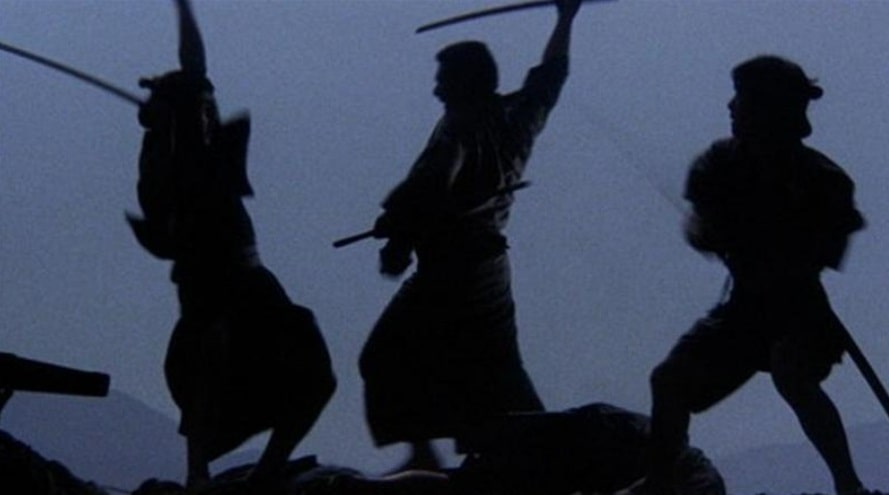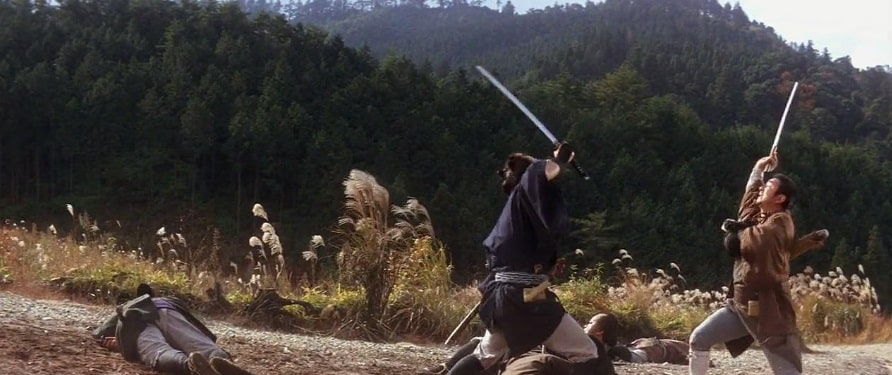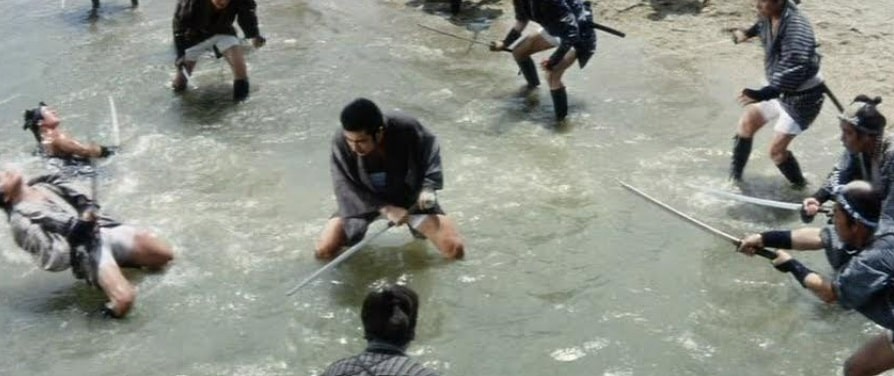Ellsworth’s Cinema of Swords: Zatoichi at Large
Zatoichi and the Chess Expert (Japan, 1965)
Looking over my notes for the forthcoming Cinema of Swords collection (to be published by Applause Books on June 15th), I realized that there were several five-star entries in the Zatoichi series, absolute gems, that I’d never covered here at Black Gate. Worse, I hadn’t devoted an article to the blind swordsman in almost two years, and there might be newer readers who hadn’t been introduced to Shintaro Katsu and his samurai-era yakuza outlaw hero.
Well, we can’t have that. Herewith are three top-notch features from the Zatoichi series — try any one of them, and then just see if you can stop yourself from watching the rest.
Zatoichi 4: Zatoichi the Fugitive
Rating: *****
Origin: Japan, 1963
Director: Tokozu Tanaka
Source: Criterion DVD
Zatoichi (Shintaro Katsu) arrives in a new town just as its annual festival is getting underway, and he throws himself into the celebration with gusto. This installment starts a pattern in which each film introduces a new skill or talent to Zatoichi’s repertoire that was previously unseen, and this time it’s sumo wrestling: at the festival Zatoichi enters a take-on-all-comers challenge and defeats five opponents, when necessary using a secret masseur grip like a Vulcan nerve pinch.
The festival town is run by Sakichi (Junichiro Narita), a young yakuza boss who’s just inherited the territory and is surrounded by other, predatory bosses who covet his tract, especially Boss Yagiri (Toru Abe), who for unspecified offenses has put a price on Zatoichi’s head, and also hired a fallen samurai named Tanakura (Jutaro Hojo) to be his hatchet man. Zatoichi has stumbled into a slow multi-sided gang war with his own life on the line, but its real hub is the hearts and desires of two women: Onobu (Miwa Takada), the young daughter of a former yakuza boss who loves Sakichi, and Otane (Masayo Banri), the lost love from Zatoichi’s past who is now the common-law wife of the samurai Tanakura. Tangled!
At this point Daiei Pictures was turning out Zatoichi features at a rate of one every three or four months, but their quality was still on an upward trajectory, and in many ways this is the best installment yet. Director Tokozu Tanaka opens the staging to a new, wider frame, setting much of the film outdoors and keeping the camera moving for a more expansive feel. And Katsu now fully inhabits the larger-than-life role of Zatoichi, humble one moment and proud of his skills the next, outraged by injustice but ashamed of his own sins.
Though the blind swordsman skillfully picks his way through the criminal intrigues of the brutal yakuza bosses, he can still be deceived by the impulses of his own sentimental heart. It leads him to defend Sakichi against Boss Yagiri and the rogue samurai Tanakura in a beautifully shot mêlée in a moonlit forest, but then comes the final confrontation, a four-way battle on a windswept beach between Zatoichi, Tanakura, all the mob bosses, and about fifty yakuza thugs.
The conclusion, after the battle, is masterful: Zatoichi consoles the forlorn, brings the estranged lovers together, and then cheerfully kabuki-dances off down the road to the sound of the festival flutes — but his face, when turned away from the others, is a mask of bitter sorrow.
Zatoichi 10: Zatoichi’s Revenge
Rating: *****
Origin: Japan, 1965
Director: Akira Inoue
Source: Criterion DVD
This is one of the finest installments in the series, stylishly overseen by TV director Akira Inoue on his first full feature, who somehow manages to strike the perfect balance between suspense, pathos, action, and humor that defines a Zatoichi movie.
Zatoichi (Shintaro Katsu) returns to Abazu, the town where he first learned the art of massage almost ten years before, only to find that his teacher, Master Hikonoichi, has been murdered and his daughter Osayo (Mikiko Tsoubuchi) has been sold into a brothel to settle the teacher’s trumped-up debts. The town is in the grip of an unholy alliance between Isoda (Fujio Harumoto), a corrupt magistrate, and Tatsugoro (Sonosuke Sawamura), a ruthless yakuza boss, who have been using tax scams to drive citizens into bankruptcy and force them to sell their daughters into prostitution. Zatoichi wants revenge for the murder of his teacher and freedom for Osayo, but he acts slowly and deliberately to make sure that in the process he tears down the entire rotten operation.
The crooks are protected by Kadokura (Takeshi Kato), the usual surly samurai bodyguard, but what really distinguishes this episode is the character of the allies Zatoichi makes along the way: Osayo, of course, but also the dice-dealer-with-a-conscience, Denroku the Sly Weasel (Norihei Miki), and his fearless eleven-year-old daughter, Tetsuru (Sachiko Kobayashi), each of whom has a tight little character arc with a satisfying resolution.
The direction is solid and brisk, bright and colorful in the peaceful scenes, bright and strident for the bursts of action. Katsu’s performance is also among his best, as by this point, he completely embraces the role of Zatoichi in all its contradictions. The music by Akira Ifukube, who had scored several previous installments, incorporates a Spanish guitar sound that appropriately evokes Italian Spaghetti Westerns, just then nearing peak popularity.
High point: there’s a scene toward the end where Denroku, who, through threats to his daughter, has been blackmailed by the yakuza into stealing Zatoichi’s cane sword, and is on his way to Boss Tetsugoro to turn it in. But guilt drives him to stop at every tavern on the way, and by the time he arrives at the last open noodle shop, he’s staggering drunk. He lurches into the shop, orders yet more saké, blurts out his sad story, and then realizes that the shopkeeper who’s serving him is none other than Zatoichi, who’s hidden there while the magistrate’s cops are combing the streets. It’s 100 ryo worth of pure gold.
Zatoichi 12: Zatoichi and the Chess Expert (or Showdown for Zatoichi or Zatoichi’s Trip to Hell)
Rating: *****
Origin: Japan, 1965
Director: Kenji Misumi
Source: Criterion DVD
This is a superb return to form after the stumble of Doomed Man, with a script by Daisuke Ito that’s one of the strongest stories yet, and direction by Kenji Misumi that shows he’s not only a master of action and emotion, but of suspense as well.
Pursued by yakuza from one of the crooked bosses he’s defeated, Zatoichi (Shintaro Katsu) takes passage on a boat across Edo Bay, trying to outrun his reputation. But there are goons from yet another yakuza family on the boat and Ichi can’t resist bilking them in a dice game, ensuring that he’ll have new enemies among the Banyu gang when he reaches the other side. He also seemingly makes a new friend of a mysterious chess-loving samurai traveling under the assumed name of Jumonji (Miko Narita). Ichi is good enough at shogi, or Japanese chess, to give Jumonji a good game, but not good enough to beat him more than once.
When Ichi is ambushed by some Banyu goons, Jumonji is able to witness his combat skill as Ichi drives off the Banyu without killing any of them. Ichi tells Jumonji that he prefers to avoid unnecessary killing, but the samurai’s reply is that when he fights, he kills, because winning is what matters. In fact, he’ll kill anyone who might defeat him at anything — but not Ichi, because “I don’t kill opponents I like.”
However, though no one was killed in the goon scuffle, a young girl got cut by one of the fleeing thugs and the next day she comes down with a fever: tetanus. Her name is Miki, and she’s the niece of a traveling shamisen player called Otane (Kaneko Iwasaki), a name of ill omen to Zatoichi, as that was the name of his dead first love. He feels responsible for the girl’s illness and offers to travel to get the expensive medicine she needs. And he does so, but in a marsh at night on the way back he’s jumped by the Banyu, and there’s a brilliantly choreographed fight in which Zatoichi tries to defend himself in the swamp without losing the box of medicine.
Miki’s fever breaks, but to make sure she fully recovers, Zatoichi proposes that they take her to the hot springs at Hakone, and Jumonji, intrigued by Ichi, tags along as well. Otane is more than intrigued with Ichi, she’s smitten, but there are further complications ahead: another dangerous samurai and his cross-dressing sister, pursuers from two gangs of yakuza, and revelations about Otane’s true background. As the characters’ intertwining pasts are gradually revealed, the story becomes a double murder mystery. Zatoichi, turning detective, deduces the solution — but it isn’t going to make anybody happy. Except the viewer, who will go home completely satisfied.
Where can I watch these movies? I’m glad you asked! Many movies and TV shows are available on disk in DVD or Blu-ray formats, but nowadays we live in a new world of streaming services, more every month it seems. However, it can be hard to find what content will stream in your location, since the market is evolving and global services are a patchwork quilt of rights and availability. I recommend JustWatch.com, a search engine that scans streaming services to find the title of your choice. Give it a try. And if you have a better alternative, let us know.
Previous installments in the Cinema of Swords include:
For the Horde!
The Princess Bride Redeems the 80s
Samurai Stocking Stuffers
Moonraker! (No, Not That One)
Cinema of Swords Book Announcement!
Fury of the Norsemen
Samurai With a Twist
The Barbarian Boom, Part 7
Avenging Women
Mondo Mifune
Near Misses in the Near East
Banditti!
LAWRENCE ELLSWORTH is deep in his current mega-project, editing and translating new, contemporary English editions of all the works in Alexandre Dumas’s Musketeers Cycle; the sixth volume, Court of Daggers, is available now as an ebook or trade paperback from Amazon, while the seventh, Devil’s Dance, is being published in weekly installments at musketeerscycle.substack.com. His website is Swashbucklingadventure.net. Check them out!
Ellsworth’s secret identity is game designer LAWRENCE SCHICK, who’s been designing role-playing games since the 1970s. He now lives in Dublin, Ireland, where he’s a Narrative Design Expert for Larian Studios, writing Dungeons & Dragons scenarios for Baldur’s Gate 3.




The Zatoichi movies are great!
I sold my children – all three of them – so I could buy the Criterion Complete Zatoichi blu-ray set… and haven’t regretted it for a minute.
I’ve already commented on this small error in a previous post regarding Zatoichi. He is not yakuza, but a wandering masseur. Yakuza means a mobster, and Zatoichi is a wanderer who oftentimes fights against them, standing on the side of the wronged.
Another Ellsworth’s Cinema of Swords? More Zatoichi, Please!
I’ve seen just about every one of Shintaro Katsu’s Zatoichi movies and I must agree with your verdict on these three films: they are superb! Any of SK’s Zatoichi films is worth watching at least once; these are worth buying and keeping.
Thank you, Mr. Ellsworth.